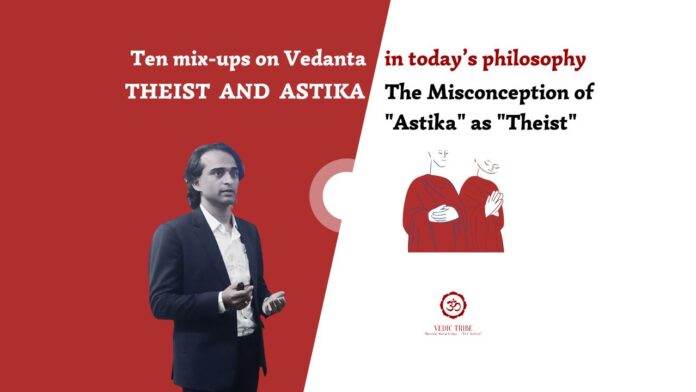The Misconception of “Astika” as “Theist”
In the previous article, we discussed the difference between Brahmin / Purohit and Priest. In this article, we will discuss why the term “theist” is insufficient to understand the term “astika”.
The term “Astika” is often equated with “Theist”, the former has wider connotation than the later. While both terms relate to belief systems, their meaning have different degrees.
Who is a theist?
The term theism is derived from the Greek theós or theoi meaning ‘god’ or ‘gods’.
The term “theist” exclusively refers to a person who believes the existence of God.
The True Meaning of “Astika”
Asthi: In Sanskrit, “asthi” means “exists”. In Vedic tradition, existence of the world is not a matter of debate, rather existence of “soul” and “god” are the matters for deliberation. Those who believe that soul or God exist are considered “asthika”.
Authority of Vedas: In wider context, “Astika” refers to someone who accepts the authority of the Vedas as a source of knowledge. This acceptance doesn’t necessarily imply belief in God. It’s a broader category that encompasses various philosophical schools within the Vedic tradition.
Asthika and Nasthika Darshana: There were numerous schools of thought developed in India – many adhering to the authority of Vedas while some rejecting the authority of Vedas. Those schools accepting the authority of Vedas were called “Astika Darshana” (Samkhya, Yoga, Vaisheshika, Nyaya, Mimamsa and Vedanta). Those schools rejecting the authority of Vedas were called “Nastika Darshana” (Buddhism, Jainism…etc)
Ishwara-vada:
“Ishwara” refers to God, and “vada” means doctrine or philosophy. Ishwara-vada, therefore, deals with the question of God’s existence.
While most of the Asthika Darshanas accepted the existence of God, few rejected. For instance, Samkhya which rejected “God” is called Nirishwara Samkhya and that which accepted God is called Seswara Samkhya. Irrespective of their belief in God, they both accept the authority of Veda and hence both are Asthika Darsha.
The Spectrum of Astika Beliefs
Theistic Astika: This includes those who believe in God, such as the followers of the Vedanta schools of Sri Shankaracharya, Sri Ramanujacharya and Sri Madhwacharya.
Atheistic Astika: This includes those who do not believe in a personal God but still accept the authority of the Vedas. The Nirishwara Samkhya school and Vaisheshika School fall into this category.
The Importance of Understanding “Astika”
Understanding the true meaning of “Astika” is crucial for appreciating the diversity of thought within the Vedic tradition. It helps to avoid reducing the rich and complex philosophical landscape of Vedic tradition to a simplistic theistic-atheistic dichotomy.
By recognizing the nuances of the term “Astika,” we can gain a deeper appreciation for the pluralism, diversity, philosophical depth and intellectual rigor of the Vedic tradition.
Key takeaways:
When you hear someone use the term theist / theism in Vedic context, politely correct them to use Ishwara-vada. You can also ask them to use the term “asthika” / “Nasthika” by understanding the larger Vedic context.
In the next article, we will discuss the eight mix-up – “Illusion and Maya”.
Madhwesh K
Vedic Tribe

